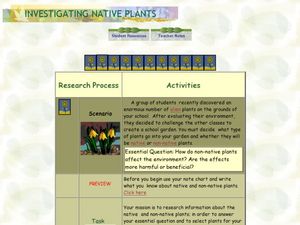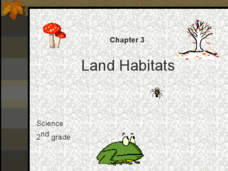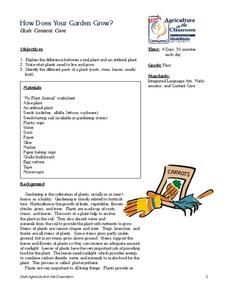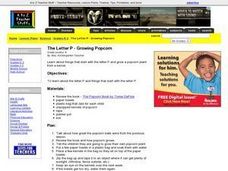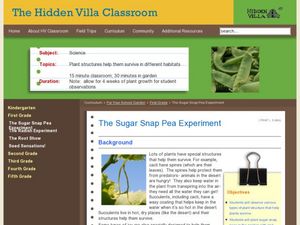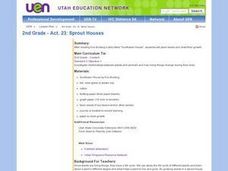Curated OER
Sequence Writing: Life Cycles - Plant Life
Students investigate the stages of plant life. Students create a K-W-L chart. They describe six main stages of the plant life cycles. Using stickers, students create a life cycle flow map.
Curated OER
Investigating Native Plants
Students explore Earth science by participating in a gardening activity. In this botany lesson, students discuss a group of non-native plants that would grow well in a school garden. Students complete a plant science graphic organizer...
Curated OER
Dig In - Grow your own grub
Students monitor the growth of a plant over several weeks. In this earth science lesson, students plant a courgette plant, take digital photos, and upload them to the BBC gallery. They turn their photos into live animation showing the...
Captain Planet Foundation
Help a Sister Out: Garden Companions
Explore Native American gardening traditions with a lesson on companion planting. Based on the concept that certain crops grow better when planted near other specific crops, kids research the gardening method with background links and by...
Alabama Learning Exchange
What do Plants Need?
Students plant seeds and watch them sprout. Once growing plants are placed in different conditions and students record data about their growth. They graph the data.
Curated OER
WET Science Lesson #3: Comparison of Aquatic and Terrestrial Plants
Elementary life science explorers compare and contrast aquatic and terrestrial plants (elodea and soybeans) in a Venn diagram. Some background information is provided to support direct instruction, and general instructions are provided...
Curated OER
Growing Garden Companions.
Students understand that some plants grow better with other plants. In this companion planting lesson, students observe the "three sisters" growing system used by the Native Americans. Students understand that small gardens grow better...
Curated OER
Land Habitats: Grade 3 Science
Build your students scientific vocabulary with this slide show on land habitats. Each slide provides a vocabulary word, image, and definition of a term common to habitats and the environment. Great for science class or as comprehensible...
Curated OER
Garbage Plants
Students create plants out of garbage. They identify items that can be recycled and discuss natural resources. They share their creation with the class.
Curated OER
How Much Water Do Plants Need?
Students experiment with the effects of varying amounts of water on household plants. They give different amounts of water to plants and then observe and record the effects.
Curated OER
Seeds! What is Inside; How does it Grow and Why is it Important?
Students discover the importance of seeds in relationship to nature. In this plant growth lesson plan, students create a collection of seeds and discover the best type of environment to plant them. Students plant their own wheat seeds...
Outside Education
Plant a Plant in Anything!
Primary graders repurpose items brought from home to create containers for plants. After poking holes in their containers, kids add soil and plant seeds or transplant an item, and then observe and draw conclusions about which items make...
Curated OER
See How They Grow: Plants And Their Parts
Students discuss what plants require in order to grow, identify plant parts and their functions and discuss a video about plants. They conduct a controlled experiment with bean seeds and then record and observe the bean plants.
Curated OER
How Does Your Garden Grow?
Students identify what plants need to grow. In this plant biology lesson plan, students analyze the differences between an artificial plant and a live plant. Students plant seeds and discuss what plants need to grow. Students observe the...
Curated OER
The Letter P-Growing Popcorn
Students explore the letter P and things that start with the letter P. They read The Popcorn Book by Tomie DePola. Students discuss things that start with the letter P. They plant their own popcorn plant and watch as the popcorn seeds...
Curated OER
COMPARE SOILS BY GROWING PLANTS
The student will identify the difference in the rate of plant growth in three soils that vary in organic matter.1. Obtain three to four flowerpots, different types of soil, a record chart, three to five beans for each pot, and water....
Curated OER
Growing Shamrocks!
Students discover Irish heritage by planting seeds. In this botany lesson, students utilize a shamrock cookie cutter to create a form which they can grow alfalfa inside. Students observe the plant growing over the next few weeks.
Curated OER
Science Quiz: Plants
In this science quiz: plants worksheet, learners answer 10 questions about botany trivia, then scroll down to check their answers.
Curated OER
Flower Power
Determine which plants are flowering plants with a helpful lab sheet. Kids first observe illustrations of different plants, such as a carnation and a fern, then decide which plants produce flowers, spores, or cones. Use magazine pictures...
Curated OER
Dirt Babies
Dirt babies are an excellent way to show young botanists the plant life cycle. They explore the functions and industry behind grasses before growing some of their own. Use the informational text here and consider implementing some...
Curated OER
The Sugar Snap Pea Experiment
Students examine types of plant structure. In this plant biology lesson, students observe various types of plants, such as ivy and grapes, and discuss the differences in structure. Additionally, students plant sugar snap peas, using a...
Curated OER
2nd Grade - Act. 23: Sprout Houses
Read the story "Sunflower House," by Eve Bunting with your 2nd graders to investigate the relationships between plants and animals. They will discover how living things change during their lives by creating their own sprout houses. In...
Curated OER
Sorting Things Out
Written to examine seeds that grow in Kansas, you can adapt this lesson to anywhere you live. Learners sort a mixture of five different seeds to by any characteristic of their choice. When your budding scientists are exploring the life...
Curated OER
Plant Power
Here is an opportunity for your first graders to take a close look at plants: what they need to survive, how they grow, and the names of each plant part. The book, Corduroy's Garden is used to open the lesson. Then, youngsters utilize...



